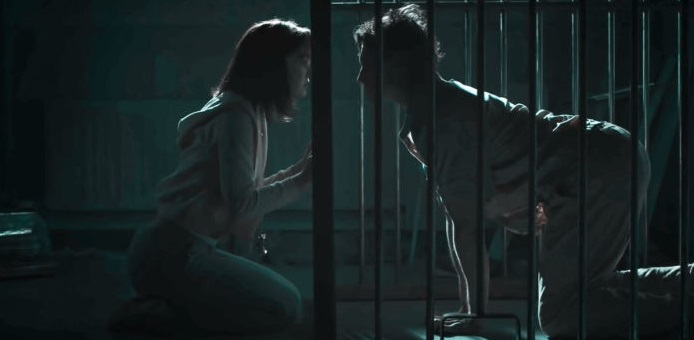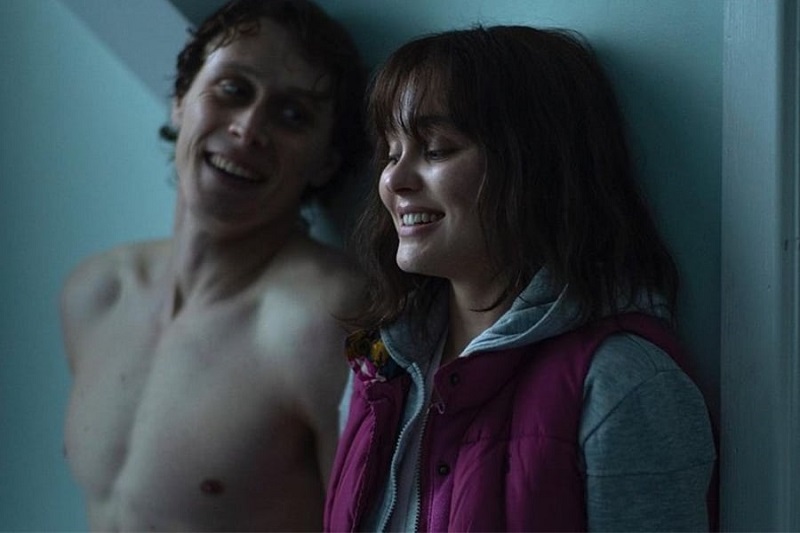Nathalie Biancheri’s Wolf is an immersion therapy commentary, masked as a fantastical look at a segment of our youth who truly believe to their core that they are animals and birds. 1917 breakout star George McKay believes that he is a wolf. He treasures rolling around in the woods naked and howling at the moon. Keep in mind, this is never achieved with humor. This is painted by the filmmaker as something serious that is mental-centric and in dire need of therapy.
Enter a facility run by a man called The Zookeeper (he’s a doctor, don’t you worry), played by Paddy Considine with fierce aplomb. He has a mixed bag of creatures in his charge and although to the outside world, i.e., these people’s deeply concerned families, he is as soft as a sheep. But it doesn’t take long before we see that this doctor is a wolf in sheep’s clothing. He rules his clinic with an iron fist and like so many “conversion therapy” situations, that hardly works. But yet, he keeps plugging along.
There are many scenes that are downright disturbing. McKay’s Jacob is chained in a cage at one point for an extended period of time. The Zookeeper is desperate to “break” him and return him to being a normal young man. Jacob meets Lily-Rose Depp’s Wildcat and the sparks immediately fly. She has been there for a while and shows Jacob the ropes and as such, they become close. One might even think they are on the cusp of falling in love. But if this institution will have any say in that, that emotion must stay far away because love has no business at the clinic of souls who believe they are animals.
Biancheri has raised some interesting points in her film foray, especially when it comes to conversation therapy—which is still used to this day to treat gay and lesbian children and adults in hopes that they exit the program a full-bodied heterosexual. The same mentality applies here, but to the Nth degree. At one point, when a patient who believes he is a German Shepard pees on the floor, The Zookeeper rubs his face in it violently. That, right that, encapsulates his attitude with how to treat these damaged souls who seem innocent enough, they just simply believe they are various animals.
The developing love story between Wildcat and Jacob anchors this film and gives it its emotive power. The two actors are at the top of their game. McKay in particular is sublime. Someone studied the movements of wolves, and it is uncanny. He is every bit the canine creature yet fused with human elements that are wholly important to his characterization.
Enough cannot be said about the talent of this young British thespian. The depth to which he went to capture Jacob is intense and mesmerizing. The sounds, the movements, the mannerisms, and even the way he holds his hands and moves his eyes—all wolf. Yet, there are numerous moments where he is as human as you and me. It’s a performance that should only solidify his place in cinema after that stellar turn in 1917.
Depp continues to rise out of her famous father’s shadow. She too nails the movement of the animal her character believes she has become. But there is something there—deep down—that is not quite off. Her adoration and passion for Jacob is clear, but her commitment to her animal side is not as intense as Jacob’s. Perhaps because she’s getting “better” after months in the facility. Or perhaps, it’s something else? Either way, the actress keeps the viewer guessing until the close of the film. How it ends, you will not see coming.
Biancheri makes a promising turn with a difficult subject matter. It honestly, could have been a project that may have produced laughs by the audience. But this is treated as a mental issue, that runs so deep that we believe that they believe that they are more animal than human, and it shows on every frame of film.
Grade: A-


